We are fearfully and wonderfully made. But even more, we’re fearfully and wonderfully saved.
—Samuel Sey—
The law says, “Do!”
The gospel says, “Done!”
The law places the day of rest at the end of the week.
The gospel places the day of rest at the beginning of the week.
The law makes blessing the result of obedience.
The gospel makes obedience the result of blessing.
The law says, “Run!” but it doesn’t give us any legs.
The gospel says, “Fly!” and it give us wings.
Oh, thank God for the gospel! What the law could not do in that it was weak through the flesh, Christ, dying for sinful flesh, brought to us light and life and immortality in the gospel” [Rom. 8:3; 2 Tim. 1:10].
—Adrian Rogers—
Key points: The Bible is clear. As important as helping the poor, feeding the hungry, healing the sick, encouraging the downtrodden, and working to bring about needed social changes are, the gospel is not about any of these things. Instead, the gospel is about spiritual redemption, about a person’s being made right with God in and through Christ. Leaders at the North American Mission Board should know this; but alarmingly, they have given us reasons to wonder if they really do.
All of the articles in this series are available on this page.
In 1 Corinthians, just before he expounded on the importance of the resurrection of the dead in general and Christ’s resurrection in particular, the apostle Paul declared to the Corinthian believers,
151 Now, brothers and sisters, I want to remind you of the gospel I preached to you, which you received and on which you have taken your stand.2 By this gospel you are saved, if you hold firmly to the word I preached to you. Otherwise, you have believed in vain.

3 For what I received I passed on to you as of first importance: that Christ died for our sins according to the Scriptures, 4 that he was buried, that he was raised on the third day according to the Scriptures, 5 and that he appeared to Cephas, and then to the Twelve. 6 After that, he appeared to more than five hundred of the brothers and sisters at the same time, most of whom are still living, though some have fallen asleep. 7 Then he appeared to James, then to all the apostles, 8 and last of all he appeared to me also, as to one abnormally born.
9 For I am the least of the apostles and do not even deserve to be called an apostle, because I persecuted the church of God. 10 But by the grace of God I am what I am, and his grace to me was not without effect. No, I worked harder than all of them—yet not I, but the grace of God that was with me.11 Whether, then, it is I or they, this is what we preach, and this is what you believed (1 Cor. 15:1-11, NIV).
Here Is the Gospel
In this brief passage, we learn what the gospel is. The word translated gospel, of course, means good news, specifically the good news about God’s plan of salvation. Paul said he wanted to remind his readers “of the gospel I preached to you” (v. 1). What did Paul go on to say was true about that good news? In verses 1 and 2, he described how his readers had responded to it when he shared it with them.
-
-
- Paul had preached it to the Corinthians (v. 1).
- The Corinthian believers had received it (v. 1).
- On it the Corinthians Christians had taken their stand (v. 1).
- By it the Corinthian Christians had been saved (v. 2)
- if they would “hold firmly” to it (v. 2).
- If they had “believed in vain,” or believed something other than what Paul told them in the first place, they weren’t saved at all.
-
And exactly what was this good news? Paul was absolutely clear. The gospel is the good news
-
-
- 3 that Christ died for our sins according to the Scriptures,
- 4 that he was buried,
- that he was raised on the third day according to the Scriptures, 5 and
- that he appeared to Cephas, and then to the Twelve.
-
Paul went on in verses 6-8 to name others to whom the resurrected Christ had appeared, including “more than five hundred of the brothers and sisters at the same time.” After that “he appeared to James, then to all the apostles.” Then later Christ appeared to Paul, who was traveling to Damascus to persecute Christians there.
In 1 Corinthians 15:9-11, Paul emphasized just how transformative this gospel was in his own life. He wrote, “But by the grace of God I am what I am, and his grace to me was not without effect.” The word translated grace in 1 Corinthians 15:10 refers to the unmerited favor and kindness of God — and this same Greek word appears in Ephesians 2:8-10:
8 For by grace you have been saved through faith, and that not of yourselves; it is the gift of God, 9 not of works, lest anyone should boast. 10 For we are His workmanship, created in Christ Jesus for good works, which God prepared beforehand that we should walk in them.
Notice that salvation comes “by grace…through faith” in Christ’s work, not by anything we have done. Salvation, including forgiveness of sin and eternal life, is God’s “gift” to those who believe in and are relying on Christ’s death to save them. A gift isn’t a gift unless it is freely offered and freely received. The “good works” mentioned in verse 10 come as a result of one’s having been saved. As Christians, we perform good works, not for salvation, but from salvation. Joyful obedience to divine commands results from our being “His workmanship” and our having been “created in Christ Jesus for good works.”
As Christians, we perform good works, not for salvation, but from salvation.
What, then, does an individual have to do to be saved? He or she must believe Jesus is Lord and avail himself or herself of His saving work on the cross. Elsewhere Paul put it this way: “[I]f you confess with your mouth the Lord Jesus and believe in your heart that God has raised Him from the dead, you will be saved. For with the heart one believes unto righteousness, and with the mouth confession is made unto salvation.” Make sure you understand that this passage does not indicate works are necessary for salvation. Paul simply was saying that the belief that transforms one’s life has a verbal, or public, manifestation that validates the underlying belief.
In many other places in the New Testament — not just these — we learn that the gospel is good news about what Christ has accomplished for us; He and He alone has made it possible for us to be reconciled to God. As Puritan preacher Jonathan Edwards (1703-1758) declared, “You contribute nothing to your salvation except the sin that made it necessary.”
You contribute nothing to your salvation except the sin that made it necessary.
—Jonathan Edwards—
A Departure from Biblical Teaching
With this understanding of the gospel — one deeply rooted in biblical teaching — Kyle Whitt was excited to partner with the North American Mission Board (NAMB) of the Southern Baptist Convention and with Southern Baptists to become a church planter in his home state of Washington. Last time we met Kyle and learned of some concerns that arose in his mind as he went through the application process and learned about NAMB’s expectations of him and of other church planters.
The more Kyle learned, the more concerned he became; and his efforts to get clarification did nothing to alleviate his apprehension. And significantly, the core issue was the nature of the gospel itself. Did the leaders at NAMB’s SEND Network — the organization with whom Kyle was partnering — believe the work of Christ was totally sufficient for salvation, or that human works on our part also are required?
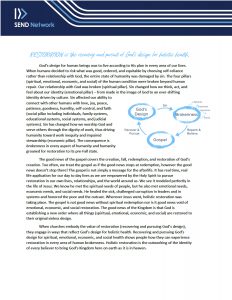
Dhati Lewis, the head of the SEND Network, also is pastor of Blueprint Church in the Atlanta, Georgia area. Kyle communicated directly with Dr. Lewis to get answers to his questions, and part of Lewis’s response was to send Kyle a brief article titled “Restoration and the 3 Circles.” You can read a PDF copy of it here. The heading at the top of the page reads, “RESTORATION is the recovery and pursuit of God’s design for holistic health.” What? Holistic health? Really? As important as it is, holistic health is not part of the gospel, but this emphasis was just one of several concerns Kyle had. Hear Kyle read from and talk about this article. Words appearing in bold type indicate Kyle is reading directly from it.
This is from a document that I was sent by Dhati Lewis. This is on SEND’s website in about three or four different forms. It’s “Restoration and the 3 Circles.” Now, if you don’t know, “The 3 Circles” is a way of teaching the gospel. You know,
But that’s not the whole story, apparently. The good news of the gospel covers the creation, fall, redemption, and restoration of God’s creation. Which is true; that’s included in that picture. Too often, we treat the gospel as if the good news stops at redemption, however the good news doesn’t stop there! The gospel is not simply a message for the afterlife. It has real time, real life application for our day to day lives as we are empowered by the Holy Spirit to pursue restoration in our [own] lives, relationships, and the world around us.
~~~~~~~~~~~~~~~~~~~~~~~~~~~~~~~~~~~~~~~
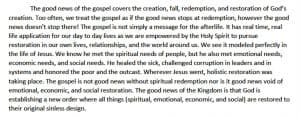
~~~~~~~~~~~~~~~~~~~~~~~~~~~~~~~~~~~~~~~
Now, that doesn’t sound that weird, but again, we’re starting to get into the territory of emphasis. He’s starting to shift the emphasis a little bit from the gospel itself to results of the gospel, and then adding restoration that we’re supposed to be pursuing. But what is this restoration? That’s been my biggest question. What is this restoration?
The Restoration Talked About In the SEND Materials Actually Adds a Requirement of Works to the Gospel
Ad libbing just a bit, Kyle continues as he reads from the same paragraph in “Restoration and the 3 Circles” and shares why the statements therein raised red flags in his mind. Note in particular the underlined sentence; we will return to it and consider it carefully following this clip.
Restoration is talked about a lot, and not in the context of the final restoration. But this restoration is to meet the social, the economic, and the emotional needs of people to challenge corruption in leaders and systems, and honor the poor, and the outcast. The gospel is not good news without spiritual redemption nor is it good news void of emotional, economic, and social restoration. The good news of the Kingdom is establishing a new order where all things (spiritual, emotional, economic, and social) are restored to their original sinless design.
Yes, God will restore all things, and that will include the spiritual, emotional, economic, and social realms. But that’s not — us doing that work is not part of the gospel. You can say that we are supposed to do works in accord with the gospel, with the transformed life that we now have, to show your salvation through your changed life. Who wants to come to a gospel that’s powerless to change people? What are you saved from if you…if there’s no transformation? There’s no salvation there. But to say that that is a part of the gospel, to say that that is an integral aspect that we do is to add a work that humans are supposed to accomplish.
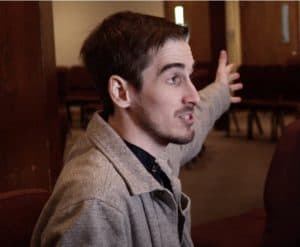
What can we do in our own power? Nothing! All our righteousness is filthy rags before the Lord. The only things we can do are the works that Christ has set out. We need to know the difference between the gospel that saves man’s souls, that transforms them —
-
-
-
- that takes a flaming persecutor of the church and transforms him into the greatest theologian in the church,
- that takes a blaspheming fisherman that denied Christ before man and makes him one of the pillars of the early church, one of the most humble men,
- that takes someone who didn’t believe who their brother was and makes him the head of the Jerusalem church.
-
-
There’s the life before, there’s the life after, and what happens in between is Jesus. He changes everything! You want to talk about complete transformation? You want to talk about restoration? That’s how it happens! It happens by Christ! Only by Christ!
Yes, there’s a lot of good we can do in this earth. We need to care about the sick. What does James tell us? True religion is this: to care for widows and orphans in their distress. But all of our love is hatred — do you understand this? — all of our love is hatred if we are not giving people the gospel that can save their soul.
No economic restoration, no social restoration, no racial reconciliation, no emotional restoration matters unless it’s rooted in Christ. Those people cannot be emotionally restored. Do you understand me? Those people cannot be emotionally restored until they’re reconciled to Christ. That gospel is the dividing wall. We cannot go out into the world and create a better society simply by our actions. If they’d tried that in Rome under persecution, we wouldn’t have a church right now.
The Authentic Gospel Must Be Good News; It Cannot Be Otherwise
Now, let’s go back to the above underlined statement that appears in “Restoration and the 3 Circles” :
The gospel is not good news without spiritual redemption nor is it good news void of emotional, economic, and social restoration.
The most important message in the universe is the gospel. As Christians, we better make certain we never distort it, and that we don’t ever misrepresent it. I want to encourage you to go back to the beginning of this article and review what we have said about the gospel, and what the Bible says about it. Kyle has acknowledged that in the “big picture” of the gospel, a restoration will occur, but God will accomplish this — not believers. Moreover, that’s the big picture.
Think in terms of simple gospel, the good news about Christ and how the Bible says a person must respond to it to be made right with God. Is there anything in the above description of the gospel about “emotional, economic, and social restoration” that we are supposed to work to bring about after placing our faith in Christ? No!
Kyle Whitt is right. Adding this emphasis to what the Bible says about Christ’s redemptive work and calling it part of the gospel involves taking the truth and mixing it with a falsehood. A false gospel is the result — yet this mixture of truth and lies is the very message the SEND Network and NAMB are disseminating and promoting in and through their church planting ministry.
And no, Kyle has not misunderstood what the leaders at the SEND Network told him. In fact, Dhati Lewis himself says the very same thing in this four-minute video.
The problem here is that NAMB, the SEND Network, and Dhati Lewis are adding to the gospel, just as Kyle Whitt has described.
Hang Tight! There’s More!
If you still doubt Kyle and me on this, please stay tuned. Next time, in part 3 (our last article in this series), we’ll see additional evidence that the church-planting arm of the Southern Baptist Convention is adding requirements to the gospel. NAMB even speaks of “The Great Requirement” in conjunction with “The Great Commandment” and the “Great Commission.” “The Great Requirement” is their term, not Kyle’s or mine.
I’ll see you next time. I plan to release part 3 very soon.
Part 3 is available here.
Copyright © 2021 by B. Nathaniel Sullivan. All rights reserved.
top image credit: Photo by Ben White on Unsplash
Unless otherwise indicated, Scripture has been taken from the New King James Version®. Copyright © 1982 by Thomas Nelson, Inc. Used by permission. All rights reserved.
The Scripture quotation marked NIV has been taken from The Holy Bible, New International Version®, NIV® Copyright © 1973, 1978, 1984, 2011 by Biblica, Inc.® Used by permission. All rights reserved worldwide.


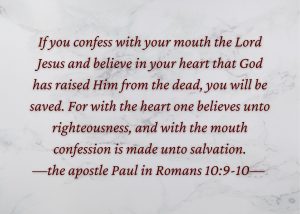
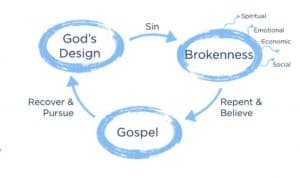
Be First to Comment